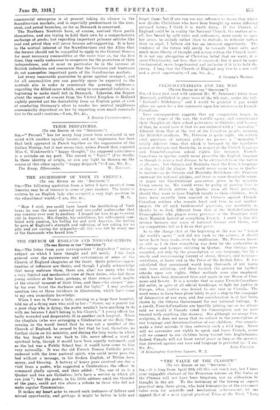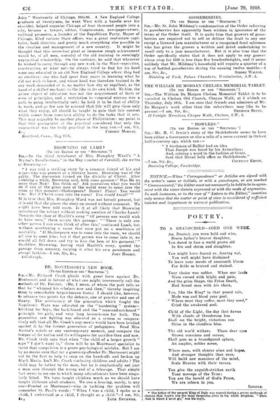"THE VALUE OF THE CLASSICS."
[To THE EDITOR OF TUE " SPECTATOR.") SIR,—It is long from April 13th till this can reach you, but I hope your enjoyable abstract of the Princeton volume on The Value of the Classics will not have been forgotten, nor an addendum be thought in the air. To the testimony of the throng of superb practical men there given, who hold hurnamisties of the extrinnest value even for scientific and mechanical achievement, let me append that of a mast typical practical Titan of the West, " Lung John " Wentworth of Chicago, 1815-88. A New England College graduate at twenty-one, he went West with a bundle over his shoulder, helped organize Chicago of four thousand people into a city, became a lawyer, editor, Congressman, newspaper-owner, railroad promoter, a founder of the Republican Party, Mayor of Chicago, filled various State offices, was a great real-estate capi- talist, bank director, and pretty much everything else possible in the creation and management of a new country. It might be thought that this seven-foot giant of immense rough achievement would be, of all men, scornful of the old training in seemingly unpractical scholarship. On the contrary, he said that whenever he wished to carry through any new work in the West—executive, constructive, or -what not—he always tried to find for its head some one educated in an old New England College where they had no electives: one who had spent four years in learning what he did not wish to know, and whose head was therefore trained to do any work demanded of it, no matter how dry or repellent, as the hand of a skilled mechanic to the like in its own kind. To him, the prime object of education was not the acquirement of facts or even of principles, and a restriction to congenial courses was a path to going intellectually soft : he held it to be that of ability to work, and as few can be assured that life will give them only what they enjoy, all should be taught to gain that fair content which comes from conscious ability to do the tasks that it sets. This may arguably be another phase of Philistinism : my point is that this protagonist of the practical considered that only the unpractical was the truly practical in the long run.—I am, Sir,



























 Previous page
Previous page